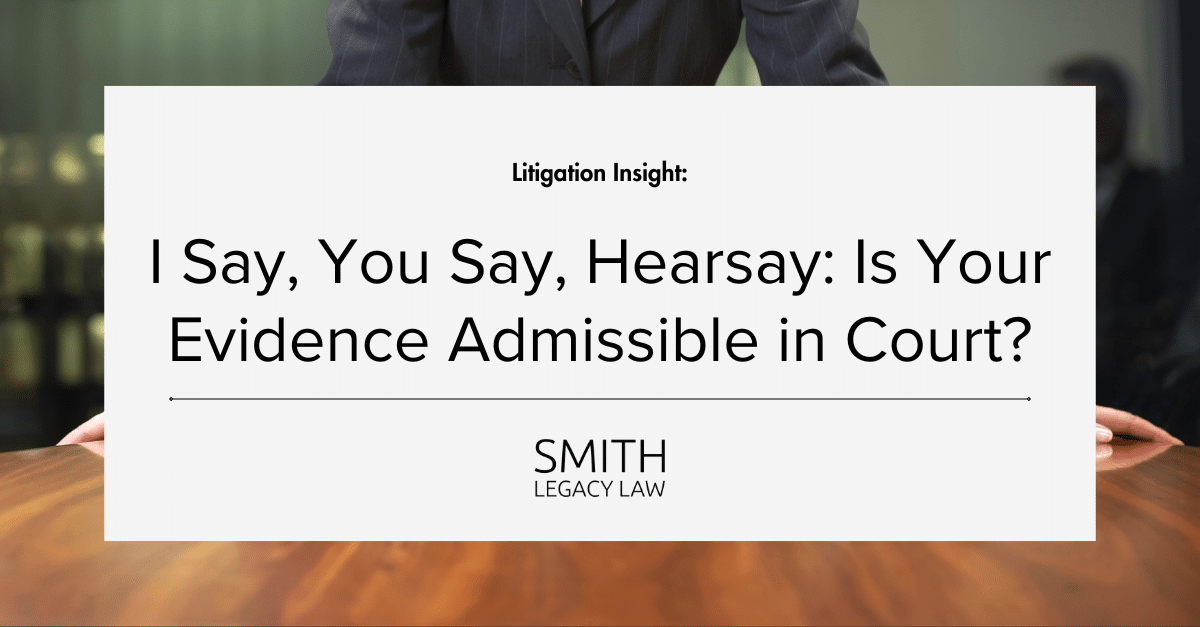One of the most important and least understood legal concepts is the hearsay rule. It’s drilled into all law students, but even the general public has heard the term in a television or movie courtroom drama. The problem is that attorneys, judges, litigants, and witnesses often get the rule wrong with serious repercussions. Failing to recognize and object to inadmissible hearsay evidence or missing a valid exception to the rule can mean the difference between winning and losing a case. This is where having an experienced attorney can make a significant difference in helping to ensure that your interests are protected and you present the strongest case possible in court.
What Is the Hearsay Rule?
Hearsay refers to an out-of-court statement used to prove the truth of the matter asserted. For example, you are going through a divorce and your child tells you that your spouse hit him. You want to testify in court about what your child said to you as proof that your spouse is abusive. Your testimony is hearsay. Therefore, generally, it is not admissible as evidence in court unless it falls within one of the numerous exceptions to the rule.
Why Is the Hearsay Rule Important?
Our justice system is very focused on ensuring that accurate, truthful, and reliable evidence is presented for consideration. Witnesses must take an oath to tell the truth. Our constitutional right to confront and cross-examine witnesses ensures that evidence is vetted for accuracy and reliability. The hearsay rule is intended to act as a type of coffee filter; reliable information passes through so that it can be introduced and evaluated and unreliable information is blocked from consideration.
From the perspective of a court, “reliability” broadly refers to whether the information is based upon a witness’s first-hand observations or is derived from a source that others look to as being authoritative. There is a rather significant difference between a witness testifying that he saw the defendant run a red traffic light and having the witness say “Several people told me the defendant ran a red traffic light.”
In the first example, a lawyer for the defendant can ask the witness questions about what he observed, whether he was distracted, was he wearing his glasses, and so on. His testimony, while possibly inaccurate, is reliable because the witness can be effectively cross-examined.
In the second example, the witness truly cannot offer any observational testimony; he wasn’t there and the people who did see what happened are not the ones testifying. Critically, how can a lawyer effectively cross-examine a witness who was not present at the scene and therefore could not observe what happened? This testimony is unreliable because it cannot be tested by effective cross-examination; if the issue is whether the light was red, it does not ordinarily matter what someone else told the witness; that other person should be the one testifying.
What Are Some Exceptions to the Hearsay Rule?
There are far more exceptions to the hearsay rule than there are applicable situations. That’s because there are situations and circumstances where substitutes for first-hand information may be deemed reliable and thereby admissible.
For instance, it may be hearsay for a parent to testify regarding what his or her child said about the other parent hitting the child to prove abuse. However, the testimony may fall within the “excited utterance” exception if the parent testifies that the child ran to the parent immediately after being hit and was crying and upset about what happened. The testimony may also be permissible if the parent testifies about how he or she reacted to the child’s statement, such as that the parent called the police. In that case, the parent’s testimony would be offered to explain why the police were called, not as proof that the other parent was abusive. Therefore, it isn’t hearsay.
Another exception is reported information which is deemed reliable because it tends to be fact-based, authoritative, and customarily relied upon by others. An individual can testify about yesterday’s closing price for Amazon stock, whether a president made a specific statement in a speech (as opposed to what he meant), and call entries contained in a cell phone bill. These are second-hand statements derived from first-hand observations, yet we, and the courts, will recognize such statements as reliable.
An expert witness can also offer hearsay evidence as part of an expert opinion provided the evidence is of a type that a reasonable expert would normally rely on. For example, an expert may be able to testify regarding information in medical or police reports, or research done by other experts.
However, problems can occur when statements derived from first-hand information are subsumed into other and later reported information. The greater the distance from the originally observed event, the less reliable later made and repeated statements become. Legally speaking, we would consider such statements to be double-hearsay and if each separate statement or observation cannot pass the hearsay rule, the whole thing is inadmissible.
Stated a bit differently, if you were not physically present at the New York Stock Exchange when the closing price for Amazon stock was announced, would you rather rely upon the next day’s Wall Street Journal for a reported closing price or a limited circulation newsletter published a month later?
How Should Hearsay Evidence Be Addressed in Your Case?
A skilled attorney will analyze all evidence to determine whether it should be excluded or not and anticipate arguments and objections. Further, an attorney should explain the rules to witnesses who will be testifying to help ensure the witness understands what is appropriate to say when asked specific questions.
If you are anticipating litigation, it is best to talk with a lawyer to discuss your situation and what evidence may be needed to prove or defend against a claim. Contact us for a consultation to learn how we can assist you in your matter.
